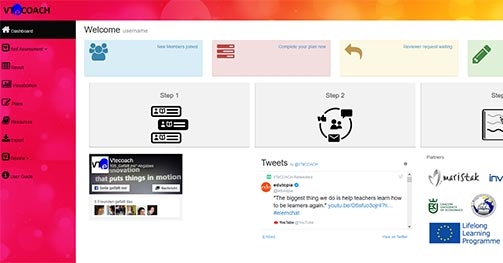The main goal of the VTeCOACH project is to develop an assessment tool based on a 360º evaluation system so that VET learners can later be provided with the necessary feedback to carry out an action plan in order to work on and hopefully improve their SOFT skills.
By achieving this goal, the project consortium tries to cover the existing gap in this kind of ICT-based methodologies for assessing the so called “wicked” competences or soft skills.
The formula of economic growth has been constantly evolving over the last years. Up until now, this economic growth has been directly linked to productivity. Nowadays, however, the importance of productivity is gradually being shrouded by other factors such as competitiveness, quality and innovation, which are deemed as clear pathways towards long term organizational success.
This paradigm shift has generated the necessity of adjusting the perspective of qualification, or, -how much we know in order to produce-to the perspective of competence, or, -how well we perform and interact with others-. Whereas the “how much we know” can be directly related to the acquisition of HARD skills (or occupational skills), the “how well we perform” would go hand in hand with SOFT skills (or personal attributes).
Programme: LIFELONG LEARNING PROGRAMME, LEONARDO DA VINCI TOI
Implementation period: 2012 - 2014
Promoter: SAN JOSE MARISTAK, Spain
Website: VtECoach Tool
Why soft skills matter
In all our prospective careers and future education, in whatever direction we are led, it is highly likely that we will be working as part of a team. We will have to take it for granted that our learning won't be stopping the day we receive our diploma. We can also be sure that we will need to be creative and innovative when we are faced with problems and attempting to come up with solutions. However, these are the types of competences that we never have to study for, nor are we ever examined on. Yet, these competences and skills are going to be extremely important in terms of how we navigate success in our lives. As well as how we learn to deal with failure.
Assessing these skills for yourself
The VTeCOACH project has developed a web app that focuses on better understanding these attributes and competences for yourself. It invites you to hold a mirror up to yourself and have a quick look to see what is being reflected back. As well as looking at yourself, it also asks your peers, classmates and teachers to help out, to give their feedback to help you get a more rounded picture.
There is also a self-actualisation element to the app, asking you to question yourself and then maybe to make a plan about something that you have learned, something that you might like to improve. There are resources and supports in the app to help you in this. You may find that the app is not relevant- you have all these skills in abundance and your peers and teachers already agree as much. But maybe you might find out something new about yourself, maybe it might help you to reflect on these skills and possibly to plan to make some simple changes.
Who developed the app?
Nexus Research together with partners from from 6 European countries worked together within this EU funded project that brings together researchers, academics and teachers to focus on developing innovative supports for learners. The result of the work to date is an online tool that aims to support students and learners to better understand those competences connected with "soft" skills, specifically teamwork, learning, innovation and creativity.
The tool gets the student to engage in an assessment process of their own competences, as well as seeking input and feedback from their peers. Their teachers or mentors are also asked to get involved. The students are also supported within the tool to make plans regarding the development of these competences, as a result of taking stock of the learning from the assessment steps.
What do I have to do to use the tool?
The web app is pretty straightforward to use. A simple registration process allows you to access the main dashboard. A short video introduction by the research team can be viewed alongside a read of the step by step instructions. While the tool can be used on any mobile device, the user experience is better on a laptop or tablet. Once you have registered and participated in the self assessment stage, you can then log in at a later stage to review the results and use the tool to make learning plans.
